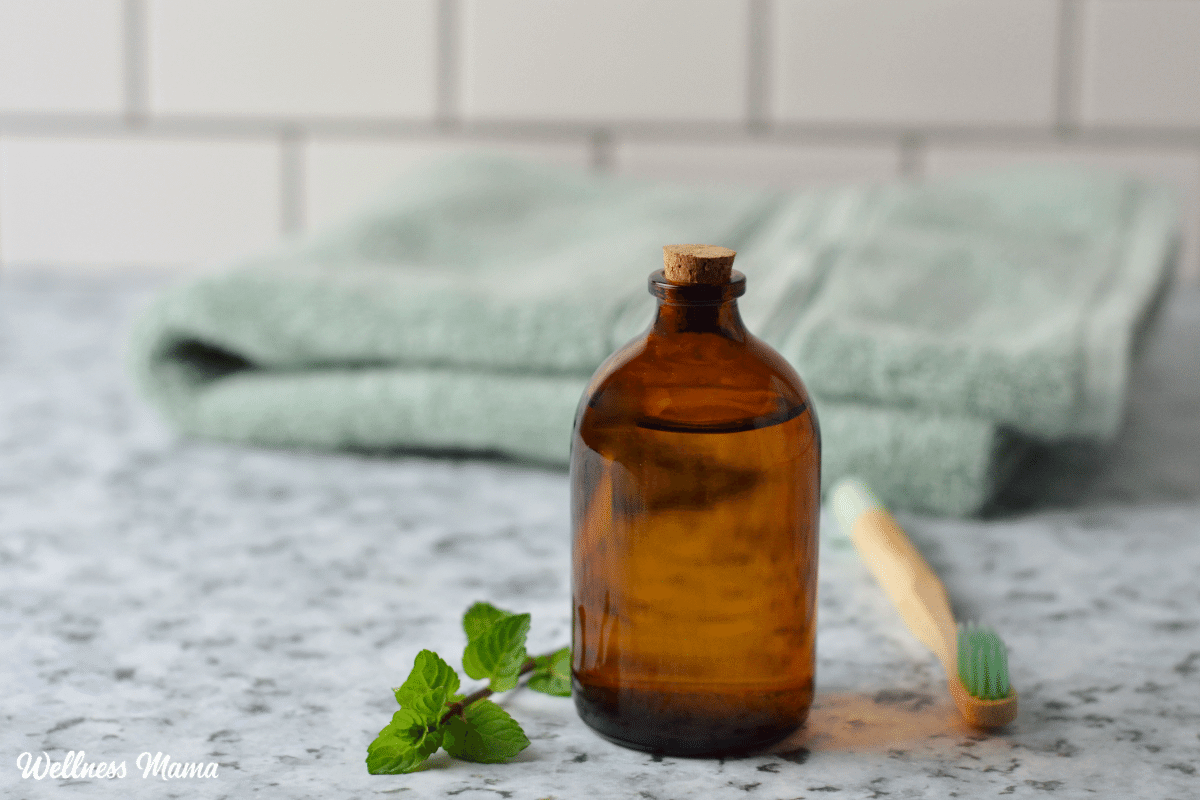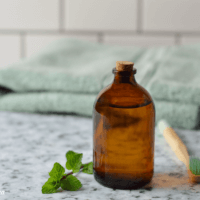Our family has now completely switched to a natural oral health routine. We eat to boost oral health and even make our own remineralizing toothpaste. Next on the list to try was a homemade mouthwash recipe.
This natural mouthwash combines herbs that are naturally cleansing and healing to teeth and gums. Because it’s in a convenient tincture, it’s easy to use and won’t spoil quickly. I get fresh breath while it naturally kills germs and alkalizes the mouth.
Why Use Herbal Homemade Mouthwash?
Commercial mouthwash is often filled with sweeteners, harmful chemicals, and artificial colors and flavors. Some of the natural options aren’t my first choice either. Many of these contain glycerine, which can coat the teeth. That’s one of the reasons why I came up with my own toothpastes for oral hygiene that are glycerin free.
For a DIY mouthwash, I knew I needed something that would tackle bad breath, dry mouth, and gum disease without the potential side effects.
Conventional vs Homemade Mouthwash
Prescription mouthwashes contain the chemical chlorhexidine to help fight gingivitis. But their success with periodontal disease is limited. And there’s also the risk of tooth staining, mouth irritation, and rare life-threatening reactions.
Good oral hygiene doesn’t have to mean opting for irritating mouthwash!
Even some the run of the mill mouthwash on the local grocery and drug store shelves have SLS, which can cause or irritate canker sores. Making your own mouthwash helps fight bad bacteria and improve dental health in a much gentler way.
Herbs and Spices For a Healthy Mouth
- Cloves – are used in oral care for their natural antiseptic, antibacterial and antiviral properties. Clove oil even helps soothe toothache or minor cavities until they can be healed or filled.
- Peppermint – adds the traditional mint flavor, but is also antibacterial and cooling to the mouth. We use it in our Wellnesse Charcoal Toothpaste.
- Plantain – is antibacterial and antimicrobial and is used in preparations for its ability to speed wound healing. It’s also a mild demulcent and anti-inflammatory to help soothe sore tissues.
- Rosemary – an aromatic and cooling herb that is also antibacterial and soothing to sore gums.
- Cinnamon Essential Oil – This helps to give the mouthwash a nice warming flavor while it fights microbes in the mouth. Cinnamon bark is more irritating than cinnamon leaf so the leaf is the preferred option here. Cinnamon is antibacterial, antifungal, and antiviral.
- Peppermint Essential Oil – You can use this with or instead of the cinnamon essential oil for a refreshing flavor. It’s also antibacterial, anti-inflammatory, antimicrobial, and antiviral. Spearmint is similar, but not quite as pungent if you prefer to use that.
- Tea Tree Essential Oil – This has a unique taste in mouthwash so I like combining it with mint when I use it. Tea tree oil is helpful against a wide array of bacteria, fungi, and viruses. If you don’t like the taste though it’s totally optional.
No Time to DIY?
Short on time and want some premade healthy mouthcare options? This Balanced Mouth Blend uses a blend of essential oils for a healthier mouth. Simply add a few drops to water and then swish. Here are some more options to try too:
- Silk Floss
- Charcoal Toothpaste
- Whitening Toothpaste
- Strawberry Toothpaste
- Biodegradable Toothbrushes
Herbal Homemade Mouthwash
Materials
- 1 tsp whole cloves (or ground cloves)
- 2 TBSP dried peppermint leaf
- 2 TBSP dried plantain leaf
- 1 TBSP dried rosemary leaf
- 8 oz rum or vodka at least 80 proof
- 15 drops peppermint essential oil (or cinnamon leaf essential oil)
- 5 drops tea tree essential oil optional
Instructions
- Place the herbs in a pint size mason jar.
- Pour the rum or vodka into the jar with the herbs.
- Cover tightly and place in a cool dark place for 2-3 weeks, shaking about once a day to help the herbs infuse.
- After 2-3 weeks, use a cheesecloth or a very fine mesh strainer to strain the herbs out of the tincture.
- Discard the herbs and pour the tincture into small dropper bottles or another glass jar to store.
- Add the essential oils, return lid and shake well.
Notes
- To use: Combine 40 drops of mouth wash with 2-3 tablespoons of water and swish in mouth for 30 seconds.
- Storage: Away from sunlight and heat and we recommend storing in an amber or cobalt tinted glass bottle to avoid degradation from light.
How to Use Homemade Mouthwash
- Keep a glass bottle with herbal tincture on the bathroom counter with a small cup or glass.
- For each use, mix a mouthful of water with about 40 drops of the tincture and swish well for 30 seconds.
- For extra cleansing, add 40 drops of the tincture to a half and half mixture of hydrogen peroxide and water instead of plain water and swish for 30 seconds.
Mouthwash Alternatives
If you’d prefer to avoid the hassle of making mouthwash, oil pulling can be a simple one-ingredient alternative. The basic idea is that oil, like unrefined coconut oil, is swished in the mouth for up to 20 minutes. This can help remove plaque and support gum and tooth health. There’s even some evidence coconut oil may be effective against the streptococcus mutans bacteria that cause tooth decay.
Oil pulling is somewhat controversial and experts debate its ability to whiten teeth or benefit other parts of the body. However, they all seem to agree it’s a safe and effective alternative to mouthwash.
Other DIY Products for A Healthy Mouth:
If you enjoyed this recipe and like making your own products, you might also enjoy these other natural oral health products:
- Homemade remineralizing toothpaste
- Simple whitening toothpaste recipe
- How to whiten teeth with charcoal
- How to remineralize teeth naturally
This article was medically reviewed by Jessica Meyers, MPAP, PA-C, RH(AHG), who specializes in herbal protocols and functional medicine. You can also find Jessica on Instagram. As always, this is not personal medical advice and we recommend that you talk with your doctor.
Ever made your own homemade mouthwash? Share below!





Leave a Reply